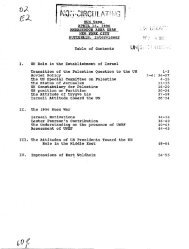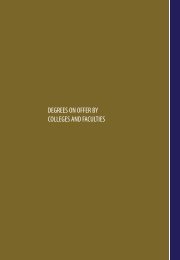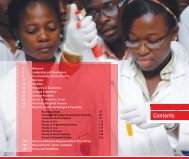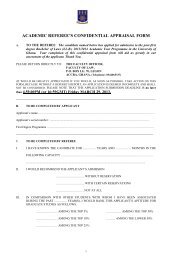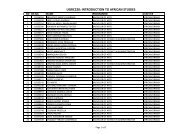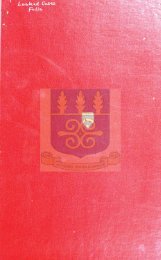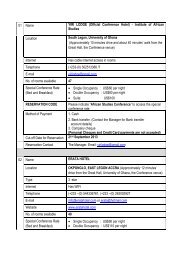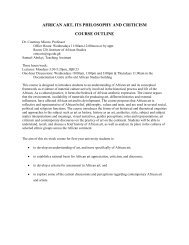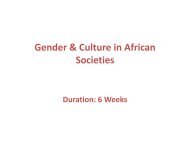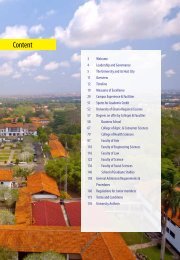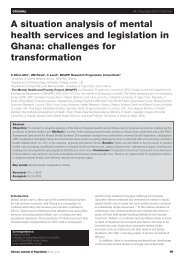(humanities): 2009 - 2011 - University of Ghana
(humanities): 2009 - 2011 - University of Ghana
(humanities): 2009 - 2011 - University of Ghana
Create successful ePaper yourself
Turn your PDF publications into a flip-book with our unique Google optimized e-Paper software.
courses in African Studies for all Level 200 students in the undergraduate degree programme <strong>of</strong><br />
the <strong>University</strong>. These courses, which cover two semesters, are compulsory. A pass in African<br />
Studies is required for the award <strong>of</strong> a bachelor‘s degree <strong>of</strong> the <strong>University</strong>. Orientation courses are<br />
available for special admission students from other institutions and agencies. Interdisciplinary<br />
seminars and symposia are organized regularly. There is a Visual Arts Section with cultural<br />
exhibits for teaching and research. The Institute‘s library supplements the Africana collection <strong>of</strong><br />
the Balme Library. Attached to the Institute is the <strong>Ghana</strong> Dance Ensemble – a resident<br />
pr<strong>of</strong>essional dance company which was started in 1962 by the then <strong>Ghana</strong> Institute <strong>of</strong> Arts and<br />
Culture to link the <strong>University</strong> <strong>of</strong> <strong>Ghana</strong> with the national theatre movement.<br />
INSTITUTE OF ADULT EDUCATION: Established originally as the Department <strong>of</strong> Extra-<br />
Mural Studies in 1948, the Institute provides university-based adult education through its<br />
branches and workers' colleges throughout the country. It provides both formal and non-formal<br />
programmes. The formal programmes consist <strong>of</strong> Diploma, degree and Masters and Doctoral<br />
degree courses in Adult Education and remedial courses for the West Africa Senior Secondary<br />
School Certificate Examinations (WASSCE), as well as a preparatory course for the <strong>University</strong>‘s<br />
mature students selection examination. The non-formal programmes comprise community<br />
education program-mmes in health, family life education, nutrition, civic education, community<br />
initiative and adult literacy. The Institute is directly involved with the organisation <strong>of</strong> a People's<br />
Education Association to support its work. Public lectures, seminars and workshops form a vital<br />
part <strong>of</strong> the Institute's activities. The most popular and national <strong>of</strong> these is the Annual New Year<br />
School which has been held regularly since 1948. The Institute also coordinates the <strong>University</strong>‘s<br />
distance learning programme.<br />
INSTITUTE OF STATISTICAL, SOCIAL AND ECONOMIC RESEARCH: Established<br />
in 1966 as the Institute <strong>of</strong> Statistics. In addition to its original concern with problems related to<br />
statistics, the Institute has expanded into the field <strong>of</strong> social and economic studies. The Institute<br />
<strong>of</strong>fers Certificate and Diploma courses in Statistics as well as a Master <strong>of</strong> Arts degree in<br />
Development Studies.<br />
NOGUCHI MEMORIAL INSTITUTE FOR MEDICAL RESEARCH: The Institute was<br />
established in 1979 in a building funded by the Government <strong>of</strong> Japan to serve as a monument in<br />
memory <strong>of</strong> Dr. Hideyo Noguchi, a Japanese medical scientist who died in Accra in May, 1928<br />
while investigating yellow fever. The Institute provides a base for medical co-operation<br />
programmes between <strong>Ghana</strong>ian and Japanese scientists, and a centre for conducting medical<br />
research relevant to <strong>Ghana</strong>'s needs. Research is conducted into problems <strong>of</strong> communicable<br />
diseases while graduate students are trained in medical research. Facilities at the Institute include<br />
specialized laboratories and services in support <strong>of</strong> public programmes. From January 1, 2000,<br />
the Institute became one <strong>of</strong> the health-related institutions grouped under the newly established<br />
College <strong>of</strong> Health Sciences.<br />
REGIONAL INSTITUTE FOR POPULATION STUDIES: Established jointly in 1972 by<br />
the United Nations Organisation and the Government <strong>of</strong> <strong>Ghana</strong>, it promotes and strengthens<br />
research and training in demography for students from English-speaking countries in Africa. The<br />
Institute <strong>of</strong>fers MA, MPhil and PhD degree courses. The Institute organizes seminars, workshops,<br />
ad hoc courses <strong>of</strong> study and in-service training in Demography and related fields at the<br />
request <strong>of</strong> governments and institutions mainly in English-speaking African countries. Given its<br />
16



